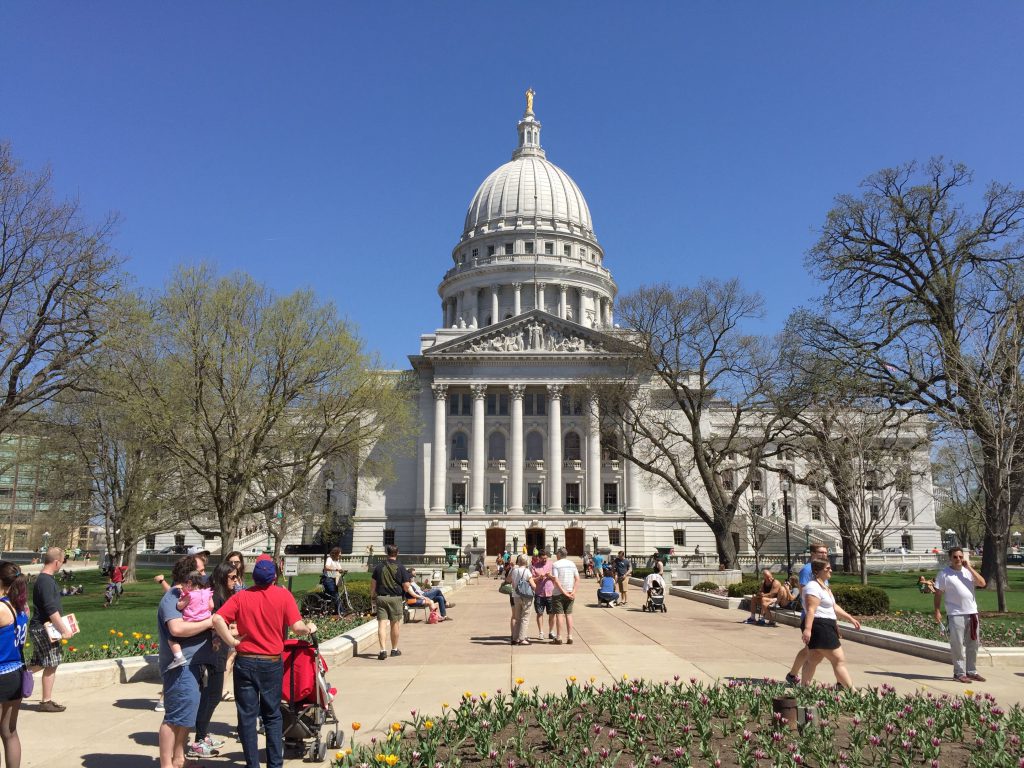Assembly Republicans Have Plan To Help Milwaukee, Will It Work?
Proposal would increase shared revenue and enable sales tax for Milwaukee, with strings attached.
Wisconsin Assembly Republicans have a plan to attempt to address fiscal issues in Milwaukee and other communities across the state. But it’s expected to come with stringent requirements on how the money is spent for the state’s largest city, including minimum police spending and an effective prohibition on streetcar expansion.
The proposal would increase shared revenue payments by at least 10% to counties and cities across the state and connect the total provided to sales tax collections, allowing the total to grow with inflation. The City of Milwaukee and Milwaukee County, which have more complicated fiscal issues, would also be given the authority to enact new sales taxes of 2% and 0.375% respectively.
From Rhinelander to Muskego, local officials have increasingly raised concern that the current fixed amount of funding provided for the past two decades was straining budgets. An effective cap on property tax revenue coupled with flat shared revenue is causing a municipal finance crunch. Adjusted for inflation, the City of Milwaukee alone estimates its annual shared revenue proceeds are down $155 million since 2000.
The City of Milwaukee has a $156 million structural deficit in 2024. Coupled with the state’s revenue restrictions, the city’s budget gap is driven by a near doubling in the cost to fully fund its pension system. That required payment is expected to be $132 million in the next budget. The new proposal, according to several sources familiar with the negotiations, would close the city’s pension system to new entrants. On Monday, city budget director Nik Kovac said such a scenario would drive up costs in the short-run, but the change could reduce long-term costs. City officials have long expected to still need to make cuts even if more revenue is received. Kovac made his comments during a public discussion on 10%, 20% and 25% cuts, and hundreds of layoffs, to the Milwaukee Police Department, Milwaukee Fire Department and Milwaukee Public Library.
The latest budget projections from the Milwaukee County Comptroller estimate the county faces a $21.9 million annual structural deficit over the next five years, leaving the county short a total of $109.5 million by 2028. But by 2027, it faces what is regularly referred to as a “fiscal cliff,” when deficits will completely consume local revenue for services that are not mandated by the state — like public transit and parks.
Using the broad framework of a proposal first introduced in February by Governor Tony Evers, Assembly Republicans propose to dedicate 20% of the state’s 5% sales tax to shared revenue payments. The century-old system was originally designed as a way to rebate income taxes to municipalities and come with restrictions prohibiting local income taxes and other local taxes. The new money would be allocated to both cities and counties. A separate $300 million “innovation fund” would also be created to incentivize municipalities to share resources across borders.
During a Thursday morning press conference in Madison unveiling aspects of the plan, Republican legislators refused to comment on the Milwaukee aspects of the proposal. “This is a tremendous opportunity for the state of Wisconsin and I truly couldn’t be prouder of the team we assembled to put this together,” said Representative Tony Kurtz (R-Wonewoc) at the morning event.
Assembly Speaker Robin Vos held a press conference in Milwaukee late Thursday afternoon to discuss Milwaukee-specific aspects of the Assembly bill. Joining Vos were Republican state representatives, county and municipal leaders from around the state, and City of Milwaukee Mayor Cavalier Johnson and County Executive David Crowley.
“What we’re announcing today is the single largest investment in local governments in the history of Wisconsin,” the Speaker said. Both Johnson and Crowley also noted the historic nature of what’s being proposed, both in terms of the cooperation between the state and local leaders and the amount of funding for local governments that’s on the table.
Johnson and Crowley underscored that the announcement Thursday was a step forward but not the end of the road for negotiations between Milwaukee leaders and the state. “The progress we’ve made is notable,” Johnson said. “In fact, it is unprecedented in modern history.” Crowley called it “an actionable step forward in making government work for the people that it serves,” adding that “there was more work to be done in this process, and this is not the finish line.”
Vos said he thought negotiations were 98% wrapped up, adding, “I think there is bipartisan agreement on almost everything in the package.”
Johnson said the increased sales tax revenue would put the city on the path to addressing its unfunded pension liabilities and that the Assembly bill would lead to a “soft close” on the city’s pension system whereby new city employees will be given pensions managed by the state. Crowley said the sales tax increase would “get us very close” to paying off some of the county’s pension liabilities, adding, “Does this fix everybody’s problems? Probably not.”
Johnson and Vos confirmed that the bill would limit the city’s Fire and Police Commission to just picking new police chiefs and that the bill does include prohibitions on using new funding for extensions of the streetcar system. The bill also includes a requirement to increase the number of sworn law enforcement in southeastern Wisconsin, Vos said.
An estimated 47% of the new shared revenue, according to Rep. John Spiros (R-Marshfield), would be targeted at communities with less than 5,000 residents. Evers’ proposal had more evenly targeted distributing the funds.
If you think stories like this are important, become a member of Urban Milwaukee and help support real, independent journalism. Plus you get some cool added benefits.
More about the Local Government Fiscal Crisis
- Mayor Johnson’s Budget Hikes Fees, Taxes In 2025, Maintains Services - Jeramey Jannene - Sep 24th, 2024
- New Milwaukee Sales Tax Collections Slow, But Comptroller Isn’t Panicking - Jeramey Jannene - Jun 28th, 2024
- Milwaukee’s Credit Rating Upgraded To A+ - Jeramey Jannene - May 13th, 2024
- City Hall: Sales Tax Helps Fire Department Add Paramedics, Fire Engine - Jeramey Jannene - Jan 8th, 2024
- New Study Analyzes Ways City, County Could Share Services, Save Money - Jeramey Jannene - Nov 17th, 2023
- New Third-Party Study Suggests How Milwaukee Could Save Millions - Jeramey Jannene - Nov 17th, 2023
- Murphy’s Law: How David Crowley Led on Sales Tax - Bruce Murphy - Aug 23rd, 2023
- MKE County: Supervisors Engage in the Great Sales Tax Debate - Graham Kilmer - Jul 28th, 2023
- MKE County: County Board Approves Sales Tax - Graham Kilmer - Jul 27th, 2023
- County Executive David Crowley Celebrates County Board Vote to Secure Fiscal Future and Preserve Critical Services for Most Vulnerable Residents - County Executive David Crowley - Jul 27th, 2023
Read more about Local Government Fiscal Crisis here
Political Contributions Tracker
Displaying political contributions between people mentioned in this story. Learn more.
- May 17, 2016 - David Crowley received $30 from Nik Kovac
- August 13, 2015 - Cavalier Johnson received $25 from David Crowley
- May 7, 2015 - Nik Kovac received $10 from Cavalier Johnson























Thank you for covering this important topic. It will be interesting to see how it all shakes out. At least working together is a good step. I wonder how Evers’ veto pen will impact the final bill.
This is a good first step but I trust local leaders to tread carefully! If 40+% is going to municipalities with fewer than 5000 people that means the urban area with approximately 40% of the state’s population and an even higher percentage of state tax revenue is being shortchanged! Base allocations on the zip code in which tax revenues were generated and see how that affects such allocations! Wisconsin is dependent on Milwaukee and Madison for their wealth creating industries which fill the coffers of the state! While gerrymandering has limited their electoral representation, it has not obviated their economic generation! Peace!
So this legislation appears to favor small communities and lets Milwaukee have the highest sales tax in the state while dictating on how Milwaukee spends much of this money. So how is this good for the city?